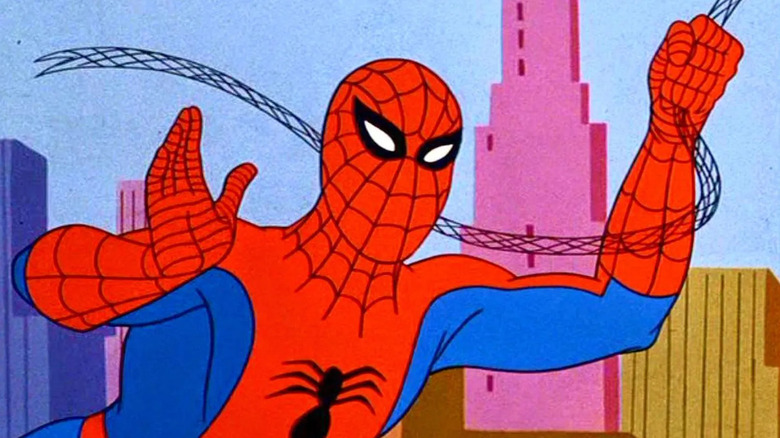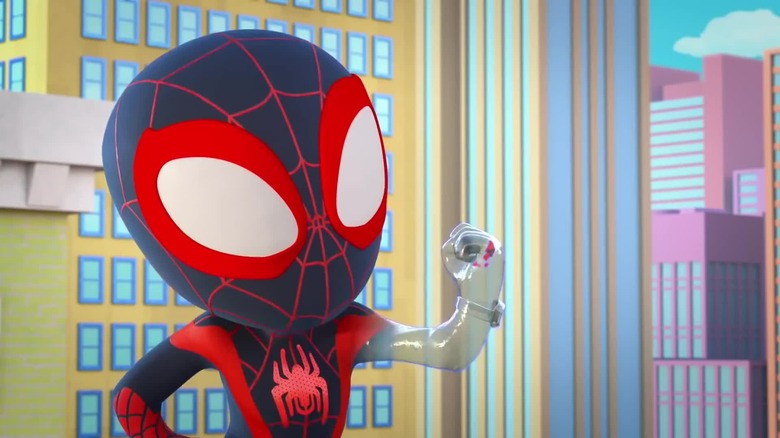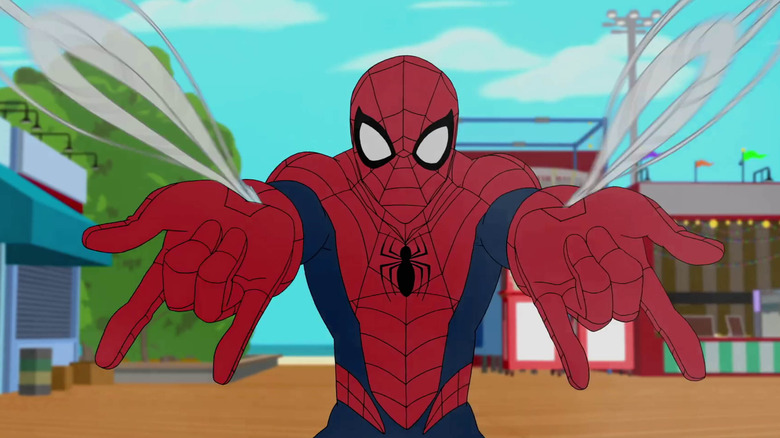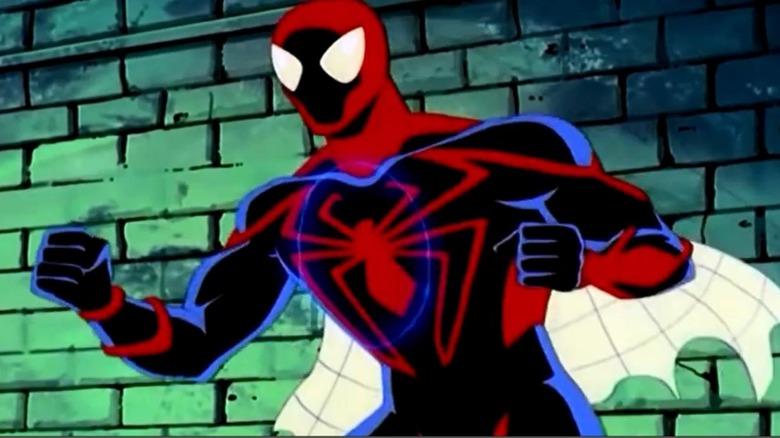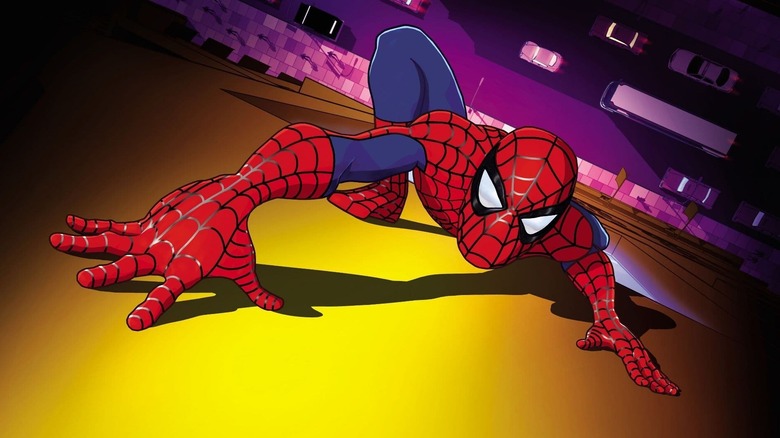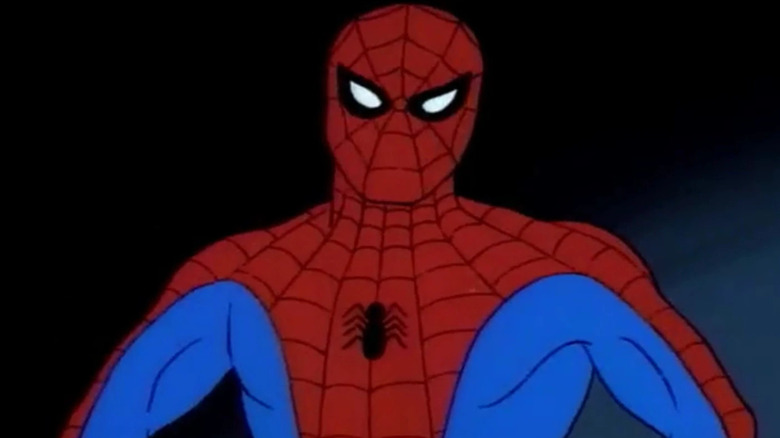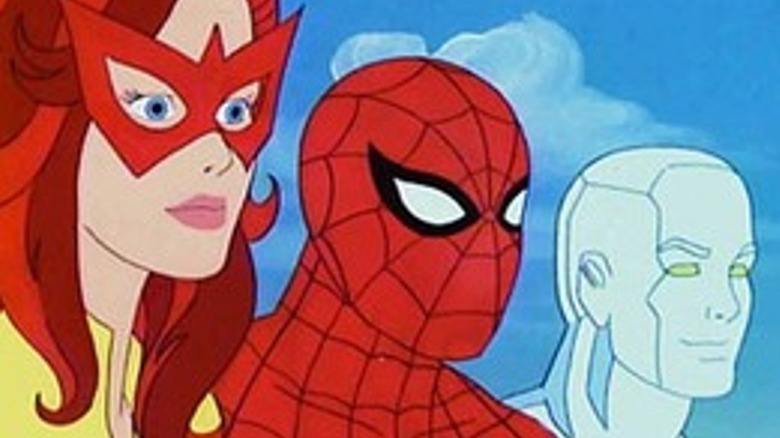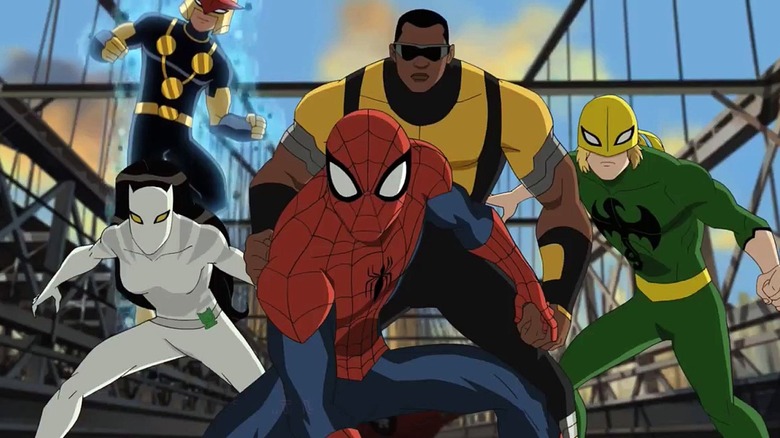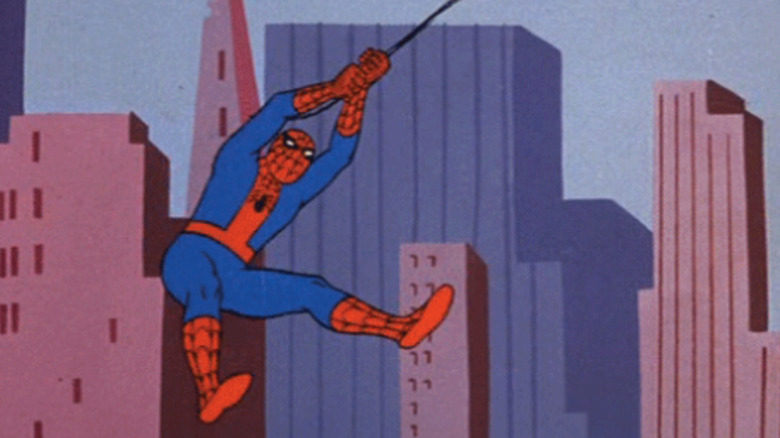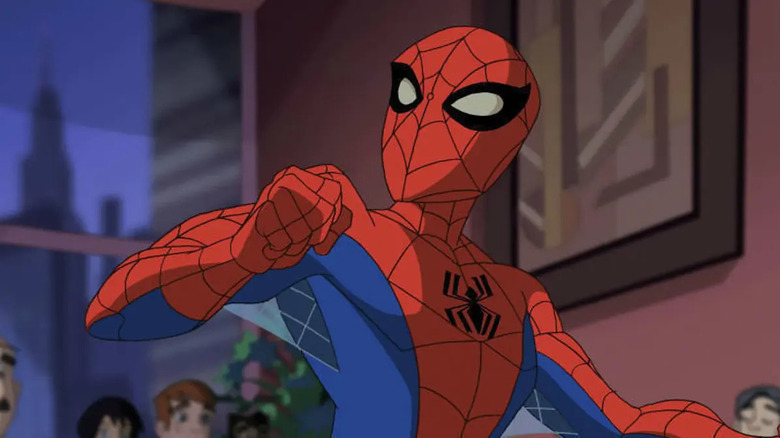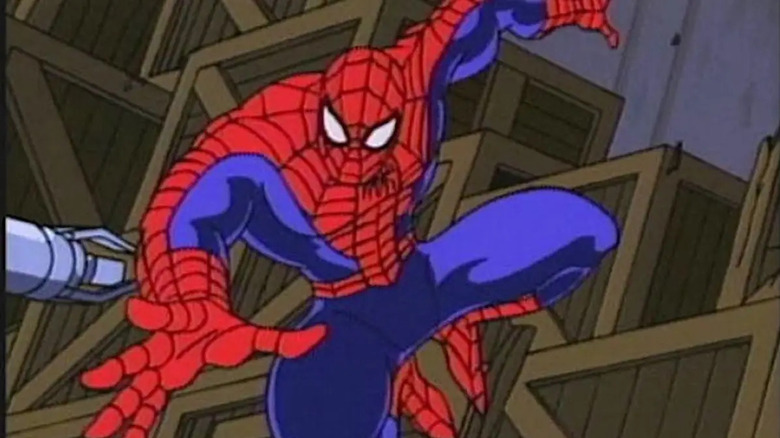Every Spider-Man Animated Series Ranked
Being Marvel's most popular and recognizable superhero, Spider-Man — and his alter ego Peter Parker — is often voted the biggest, best, or most iconic superhero in all of comic book history. Created in 1962 by artist Steve Ditko and the godfather of comics Stan Lee, Spider-Man has since appeared in countless places outside of comic books, having been adapted into big-budget movies, a live-action TV show, a variety of records, and even a high profile broadway play. It's been in animation where Spider-Man has most often made his indelible mark, burying himself into the consciousness of entire generations of kids over the years. Seeing Spider-Man on their TV screens on Saturday mornings was probably most children's first exposure to the webbed wall-crawler.
He's appeared in his own solo cartoon more than once, and in shows that featured prominent Marvel superheroes alongside him each week. Animated versions of Spidey have battled everyone from Doctor Octopus to Dr. Doom, teamed up with The Avengers, the X-Men, and the Fantastic Four, expanding the cartoon Marvel Universe and adapting many of his most famous comic book adventures for television. His shows have featured a variety of visual styles, from crude, stock animation to the most cutting-edge CGI. Some have become TV classics, while others are best left in the "better luck next time" dustbin of TV history.
From his first-ever cartoon adventures in 1967, to 2021's toddler-friendly "Spidey & His Amazing Friends," here's every Spider-Man cartoon series, ranked according to its IMDB score.
Spidey & His Amazing Friends (2021)
Aimed squarely at toddlers, "Spidey & His Amazing Friends" began airing on Disney Junior in 2021, and was a modern update to the 80s cartoon with a similar name (but we'll get to that later). Instead of Iceman and Firestar, Peter Parker's Spider-Man is teamed with Miles Morales' Spider-Man (here nicknamed "Spin" so as to avoid confusion with Peter's alter ego) and Gwen Stacy as Ghost Spider. Together, the trio are superheroes in training, appearing in a series of computer animated shorts full of youthful action and adventure appropriate for the target age group. Each episode is a pair of two short stories, where Peter, Miles, and Gwen face off against a classic Spider-Man baddie — everyone from the Green Goblin to the Rhino — and sometimes get an assist from one of their Marvel superhero friends like the Hulk, Black Panther, and Captain Marvel.
The animation style is simplistic but fun, the colors bright and often pastel, with more attention to detail shown than kids usually get from similar shows like "Paw Patrol." Though the designs are highly stylized for animation, the costumes and characters are surprisingly faithful to the comic book counterparts on which they're based, and the roster of guest stars and villains will make diehard comic book fan parents smile. Though it received a relatively low score on IMDB, it was well-received by its target audience (or rather, critics who cover such fare) and was renewed for a second season, coming in 2022.
Marvel's Spider-Man (2017)
Timed to coincide with the release of "Spider-Man: Homecoming," "Marvel's Spider-Man" took Peter Parker back to his comic book roots and planted him firmly in his own little corner of the Marvel Universe. Gone were S.H.I.E.L.D. and its team of Marvel heroes, and back were Spider-Man's own unique villains and wider supporting cast. The show even dug deeper into Spider-Man's extensive rogue's gallery, including the likes of The Jackal, Alistair Smythe, and Hammerhead as major players. Even though heroes like Iron Man, Hulk, and the Avengers did pop in for an episode here or there, this was clearly a Spider-Man-focused show, designed to appeal to longtime fans.
While it impressed many critics upon its premiere, the show never seemed to strike a chord with audiences, as it was consistently lambasted by fans online. Criticized mostly for being too adult for little kids, but not sophisticated enough for teenagers, "Marvel's Spider-Man" seemingly tried to recapture the spirit of the acclaimed 2008 "Spectacular Spider-Man" series, but the consensus was that it didn't quite know what it wanted to be. The humor was derided as too childish, and the stories a bit too simplistic. Ultimately, 2017's "Spider-Man" perhaps tried a bit too hard to be a little bit of everything and fans didn't feel it succeed at much. But it's not without its fans, with enthusiasts defending it for its many charms.
Spider-Man Unlimited (1997)
Showcasing a newer, darker animation style supposedly to reflect its newer, darker direction, "Spider-Man Unlimited" appears partially inspired by the "Spider-Man 2099" comic books that were running around the same time. Unfortunately, the series was simply too different from what fans knew and loved, with CBR calling it "one of the strangest Marvel animated series that debuted in the '90s," featuring one too many notable changes to the classic Spider-Man mythos. Set on a parallel Earth that had fallen into chaos, Spider-Man was outfitted with an all-new, all-different "nanotech" suit, an entirely new supporting cast, while his classic villains bore little resemblance to the versions fans had known and loved for decades. Reflecting the kinds of darker stories that were popular in the very late 90s, the style and tone simply didn't work for the colorful, fun super-heroics of your friendly neighborhood Spider-Man.
Still, the series should be respected for its attempt to push the envelope, even if it didn't always work. "Spider-Man Unlimited" pushed a little too hard, and the audiences that lapped up the previous "Spider-Man: The Animated Series" didn't seem to return for "Spider-Man Unlimited," and if they did, they didn't stick around. The series was canceled after one short season, and we're forced to wonder why they ended the well-loved prior series in the first place.
Spider-Man: The New Animated Series (2003)
After the wild success of Spider-Man's big-budget live-action debut in the 2002 superhero epic directed by Sam Raimi, Marvel and Sony were eager to capitalize with a new cartoon. Just four years after the failure of "Spider-Man Unlimited" a new show debuted. Developed by comic book writer Brian Michael Bendis, this new adventure series used state of the art CGI animation and featured an all-star cast that included Neil Patrick Harris as Spider-Man, Lisa Loeb as Mary Jane, Ian Ziering as Harry Osborn, and in an odd quasi-crossover with Fox's "Daredevil" film, Michael Clarke Duncan made an appearance as the villainous Kingpin.
The animation was ambitious and in some ways revolutionary, and early press really hyped up the "stunning and unique" visual style. However, the show's success or failure would hinge on the stories, which were decidedly more geared towards teenaged and adult audiences. They were similar in tone to the Sam Raimi movies, mixed with Aeon Flux-esque action, and a dash of classic comic book flavor. Unfortunately, it failed to impress and only lasted one season, though some retro reviews have given it a bit more love. "The New Animated Series" has been mostly forgotten and buried by more recent attempts at adapting the wall-crawler to animation. It ultimately suffered the same fate as the "Spider-Man Unlimited" for some of the same reasons, like trying a bit too hard to be new and different.
Spider-Man (1981)
Following on from the success of the "New Fantastic Four" and "Spider-Woman" cartoons that aired in the late 1970s, the launch of the "Spider-Man" series was the debut show from the all-new company, Marvel Productions. A spinoff of sorts, as Spider-Man had made a pair of appearances on "Spider-Woman," the series was as much focused on Peter Parker's personal life as his crime-fighting exploits, taking a cue directly from the comics.
"Spider-Man" was still packed full of superhero adventure, and the show likely satisfied kids at the time even if it was somewhat neutered by early 80s restrictions, which also likely limited its audience to younger kids. But the series did a good job of showcasing Spider-Man's vast array of villains who were brought over faithfully from the comics, and even had him square off with Marvel villains like Magneto, Doctor Doom, and the Red Skull (with an assist from Captain America). Light on drama, but high on fun, 1981's "Spider-Man" aired in syndication instead of on a network, and confusingly ran concurrently with the next entry on our list, "Spider-Man & His Amazing Friends."
Spider-Man & His Amazing Friends (1982)
For many modern fans of the character, particularly those older Millenials or Generation X-ers, "Spider-Man & His Amazing Friends" may very well be where they first became acquainted with the web-slinger. Airing on NBC for three years starting in 1981, it was a popular show even into the mid to late 80s in reruns on Saturday mornings, despite only producing a total of 24 episodes. For the first time though, Spider-Man was part of a team of heroes, appearing alongside two other adventurers each week: Iceman and Firestar, of the "X-Men," making the series an introduction to that superhero group as well.
The mutant duo became a memorable pairing for Spider-Man, and the series has been fondly remembered in the decades since for its quaint stories, colorful villains, light-hearted nature, and iconic introductions by creator Stan Lee. The animation was a step up from previous attempts, even if it was still relatively simplistic, and stories explored more of Peter Parker's personal life than the 1960s series before it, with Aunt May playing a supporting role. Short run or not, "Spider-Man & His Amazing Friends" has become an iconic part of the "Spider-Man" journey in television and movies, with the new character Firestar — created just for the series — becoming a fan favorite who eventually made her way into the comics. The threesome even inspired new stories in various comic books and on the screen nearly 40 years after its end in the early 1980s.
Ultimate Spider-Man (2012)
You may start seeing a trend here, because in 2012 a new series of live action movies was launching — Sony's much hyped "Amazing Spider-Man" reboot starring Andrew Garfield — and with a potential impending blockbuster on the way, Disney and Marvel, who now controlled the rights to Spider-Man cartoons, wanted to have a new animated series ready to hit the airwaves around the same time. This series, dubbed "Ultimate Spider-Man" (but shared almost nothing in common with the comic book series of the same name), saw Peter Parker's super hero alter ego battling villains with the help of other heroes. In a movie that was clearly inspired by the Marvel Cinematic Universe, the series opened with Nick Fury of S.H.I.E.L.D. recruiting Spider-Man to be a part of a new team of superheroes that included Nova, Luke Cage, Iron Fist, and White Tiger.
Though many of the episodes would revolve around Spider-Man's well-known roster of villains, "Ultimate Spider-Man" drew from the wider Marvel Universe, with villains like Zodiac, Juggernaut, Nightmare, Sabretooth, and Loki, as well as a parade of superhero guest stars like Wolverine, Captain America, Hulk, Doctor Strange, Deadpool, Blade, The Guardians of The Galaxy, Ka-Zar, Cloak & Dagger, and many others. It seemed Marvel was hoping to use the popularity of Spider-Man to introduce kids to all these new heroes. Reviews from fans were split, with some applauding its ambitious stories and bigger Marvel Universe, while others criticized it for not being nearly as good as the show that preceded it.
Spider-Man (1967)
In 1967, just five years after his comic book debut in "Amazing Fantasy" #15, Spider-Man debuted in his first cartoon, bringing the wall crawler into living rooms for the first time. It was a low-budget affair even for its day, using stock and recycled animation filled out with slightly moving static images, but it was the first exposure to the character for most of today's older audiences. For that reason, it still holds a place in many peoples hearts, and receives points for being the first, even if it's not the best, of Spider-Man's animated adventures. Despite its cheap animation, "Spider-Man" should be respected for lifting imagery and art directly from the comic books, giving it a quality not unlike today's "motion comics."
Retro reviews are still mixed, with Inverse's deep dive review saying "it makes 'Spider-Man 3' look brilliant" while The Thirteenth Dimension celebrated the voice talents of the cast and quirky, offbeat comic stories. Despite all its flaws viewed with 50 years of hindsight, "Spider-Man" still possesses a certain charm, and certainly it can't be faulted for being cheap or simple in an era defined by cheap and simple cartoons. But perhaps its biggest legacy was giving us the iconic "Spider-Man" theme song that has been used over and over in the decades since including a scene in Sam Raimi's "Spider-Man" film in 2002. The song has become a legitimate part of pop culture, and was even reworked in 2017 by composer Michael Giacchino as the title theme for the MCU series of live-action films.
Spectacular Spider-Man (2008)
Along with the rights to make live action movies, Sony also had the rights from Marvel to produce animated Spider-Man content, which is what gave us 2003's "Spider-Man" on MTV starring Neil Patrick Harris. Ending after just one season, it would be another 5 years before they'd try again. When they did, it would be a fan favorite.
Launched in 2008, a year after the release of Sony's "Spider-Man 3," a new series titled "Spectacular Spider-Man" debuted on Kids WB. The show was created by producer and writer Greg Weisman, creator of the acclaimed Disney classic "Gargoyles," and with him he brought everything that made "Gargoyles" so popular with fans. "Spectacular Spider-Man" was praised for exploring mature themes, and featuring bold, ongoing storytelling and compelling, complex characters. It featured fresh new takes on classic villains and Spidey's supporting cast, strong world-building, and an energy and humor that appealed to newcomers, kids, and adult diehard comic book fans alike. Weisman had grand plans for "Spectacular Spider-Man," but wouldn't get to see them to fruition.
Tragically, the series came to an unceremonious end in 2009, when in the wake of Disney's buy-out of Marvel in 2009, Sony relinquished the animation rights to Spider-Man, possibly in exchange for concessions on live-action film rights, though it's never been entirely clear. Still, "Spectacular Spider-Man" has been a fan favorite since its airing, making many "best of" lists, and still being the subject of fan campaigns to revive the series more than a decade later. With Weisman's later series "Young Justice" being revived more than five years after it too was abruptly canceled, anything is possible.
Spider-Man: The Animated Series (1994)
In the wake of the successful cartoons like "Batman: The Animated Series" and Fox's "X-Men," Marvel launched their flagship superhero in a similarly mature animated series, the singularly titled "Spider-Man" (though it's since become known more commonly as "Spider-Man: The Animated Series"). For the first time in his animated history, Peter Parker and Spider-Man would feature in epic, ongoing storylines aimed at teens and even adults. While it was certainly kid friendly, episodes took the characters more seriously, elevating the source material beyond the light, childish fare seen in "Spider-Man & His Amazing Friends." The animation got a big bump in quality too: no longer stiff and simplistic, no more stock animations, this series would feature smooth, Disney-like animation, complete with groundbreaking CGI backgrounds, necessary to tell stories with complex plots and a wide variety of locations and characters.
It also expanded the Marvel Animated Universe more than any previous show, with guest appearances from the likes of Daredevil, the Punisher, Blade, Dr. Strange, Captain America, and even a landmark multi-part tie-in with "X-Men: The Animated Series." "Spider-Man" translated big storylines from the comics like "The Clone Saga," and in its fifth season, the series adapted the sprawling event miniseries "Secret Wars" in one of the most ambitious animated crossover epics ever seen on television. It's one of the most well-regarded shows in the long pantheon of Marvel cartoons, and while critics can debate which Marvel cartoon is the best of all time, most would not exist if not for the success of "Spider-Man: The Animated Series."
